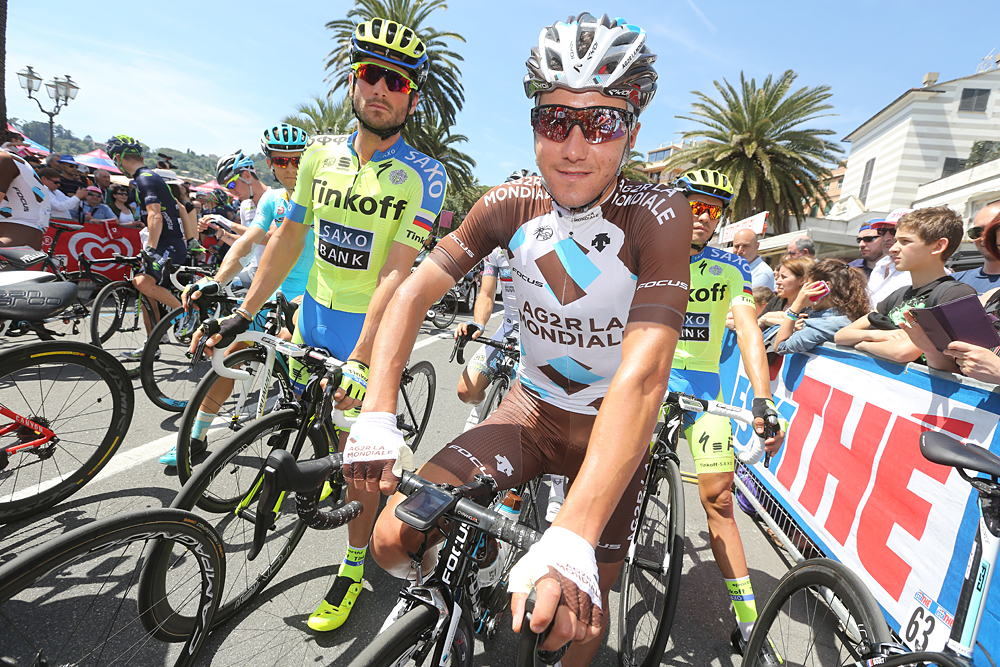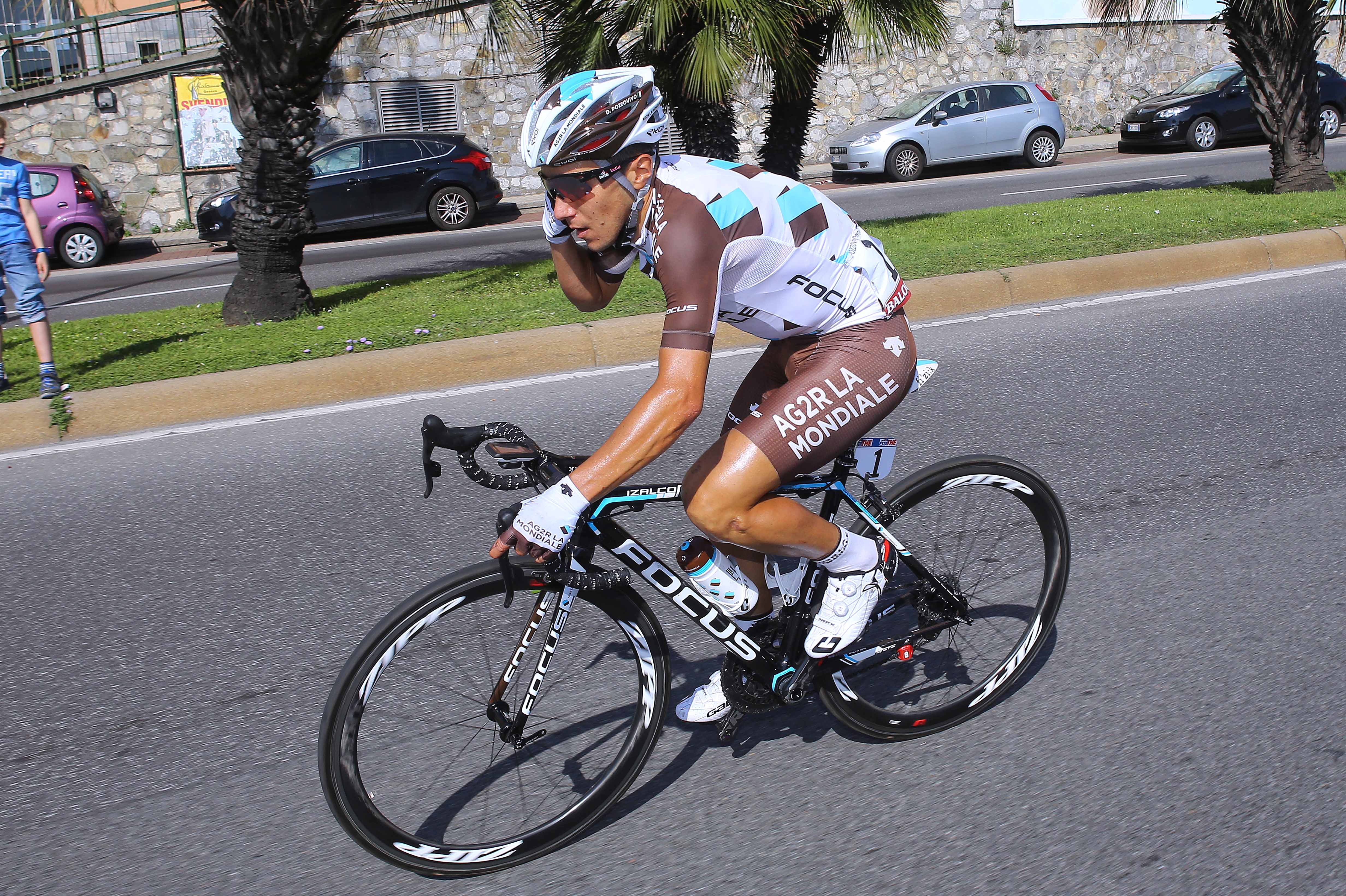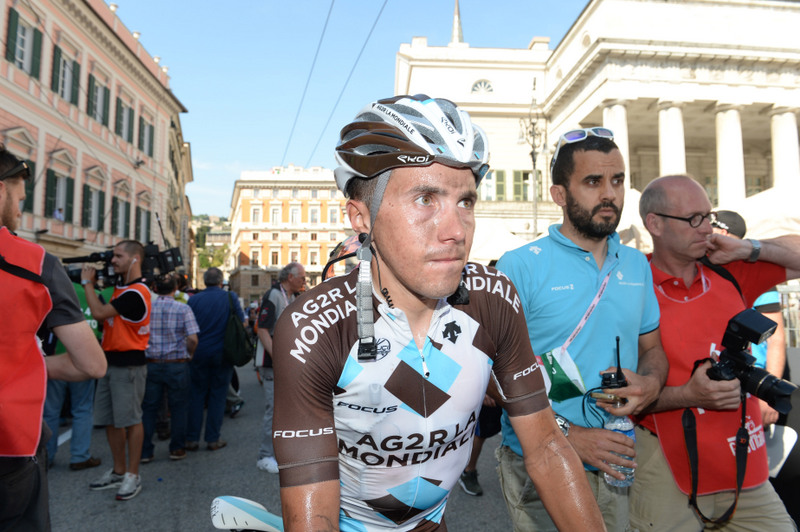Pozzovivo in serious condition after Giro d'Italia crash
Italian conscious after harrowing fall in stage 3



Domenico Pozzovivo's condition has been described as "serious but under control" following the crash on the sinuous descent of the Barbagelata in the finale of stage 3 that brought his Giro d’Italia to a premature halt.
Pozzovivo's wheels slid from under him on a sweeping right-hand bend 35 kilometres from the finish in Sestri Levante, and when the RAI television cameras showed the Ag2r-La Mondiale rider lying motionless on the roadside, his face bloodied, an eerie hush fell over the press room.
As a teammate crouched anxiously over the stricken Pozzovivo, one thought immediately of the late Wouter Weylandt, who was tragically killed on the corresponding stage on strikingly similar terrain here in Liguria four years ago, when he crashed on the descent of the Passo del Bocco.
A spectator made an ill-advised attempt to help Pozzovivo but within seconds, a race medical car had arrived on the scene, and Dr. Elena Della Valle and her colleagues tended to the prone rider as they awaited the arrival of a following ambulance.
"By the time we got there he'd lost consciousness briefly but he came around immediately," Dr. Della Valle said. "He had hit his head and had cuts on his face but he was breathing normally, he was conscious and he was able to move his limbs."
Despite the initial alarm, it was soon apparent that Pozzovivo's was not an emergency situation, and the first ambulance that passed was flagged away to continue following the main peloton. When a second ambulance arrived, seven minutes after the crash, Pozzovivo was immobilised, placed on a stretcher and driven to nearby Canevale, from where he was airlifted to the San Martino hospital in Genoa.
Dr. Giovanni Tredici, the Giro's chief medical officer, explained that Pozzovivo had been transported by helicopter as a precaution rather than as a necessity. "The roads are twisting in Liguria and there's a good traumatological centre in the hospital in Genoa, so it was more convenient to use a helicopter," he said.
Get The Leadout Newsletter
The latest race content, interviews, features, reviews and expert buying guides, direct to your inbox!
Prior to Pozzovivo's arrival in hospital, Dr. Tredici had assured RAI television that the Basilicata native's condition was "serious but under control. We're not in an emergency situation."
Speaking to reporters in the press centre in Sestri Levante after the stage, Dr. Tredici went on to sound an optimistic note about Pozzovivo's injuries. "The rider got to hospital half an hour ago and his condition is still stable," Dr. Tredici said. "He'll undergo the usual battery of tests for facial and head injuries. Our first impression is that the head injuries weren't significant but obviously we're awaiting the results of the tests."
Dr. Tredici's last such press conference at the Giro came in Rapallo on stage 3 in 2011, when he had the doleful duty of providing details of Wouter Weylandt's fatal accident. Despite the initial shock when Pozzovivo fell he stressed that it was immediately evident that his life was not in danger.
"This was a ‘normal' event. Clearly, any time there's a head injury and a lot of blood on the road, it causes an alarm and an event like the one you've mentioned comes to mind, but fortunately it was clear straightaway that this was under control," Dr. Tredici said. "You can't compare the situation."
Second crash in two days
Pozzovivo had already been the highest-profile rider caught up in the crash caused by a spectator on a fixed-wheel bike on the road to Genoa on stage 2, losing over a minute in the process. He looked to make light of the incident at the start of stage 3 in Rapallo, and vowed to go on the offensive to make up the lost ground.
"It was a strange, illogical crash: afterwards somebody told me that there was a spectator in the middle of us all. What can you say?" Pozzovivo said on Monday morning. "I try to console myself saying that the time lost isn't as important as getting injured and I got through it ok."
Barely four hours later, however, the unfortunate Pozzovivo's Giro was at an end when he was the lone faller on the long plunge down the Barbagelata. At the finish in Sestri Levante, his Ag2r-La Mondiale teammates were at a loss to explain the crash.
"The only information I have right now is that Domenico fell but I don't know how it happened. It didn't seem like a dangerous bend," Matteo Montaguti said.
Rinaldo Nocentini rolled to a halt when he saw Pozzovivo lying on the roadside, but said that his initial fears were allayed by the medical team tending to him. "I saw Pozzo on the ground when I rode past but the doctor told me that he was ok, that he didn't have any serious problem," Nocentini said.
Pozzovivo's father had been contacted by RAI television during their Processo alla Tappa analysis programme after the stage, and the initial conversation made for uncomfortable listening, as Leonardo Pozzovivo was himself still desperately seeking information about his son's condition.
Mercifully, by the close the transmission, it emerged that Pozzovivo's fiancée Valentina had succeeded in speaking to him by telephone at the hospital in Genoa. Meanwhile in Sestri Levante, maglia rosa Michael Matthews (Orica-GreenEdge) had Pozzovivo in mind as he talked reporters through his stage win.
"Unfortunately, I saw Pozzovivo crash because I was four wheels behind him," Matthews said. "It's terrible to see something like that and I don't know what to say. I just hope he's ok. It breaks your heart to see that, and along with my team, I'd like to dedicate this win to him."
Update: Ag2r-La Mondiale have announced a statement from team doctor Eric Bouvat, explaining that Pozzovivo suffered "a cranial-facial trauma but the scanner reveals no intra-cranial lesion. He has deep wounds above his right eye and received slitches. He is conscious and lucid but has no memory of the crash."

Barry Ryan was Head of Features at Cyclingnews. He has covered professional cycling since 2010, reporting from the Tour de France, Giro d’Italia and events from Argentina to Japan. His writing has appeared in The Independent, Procycling and Cycling Plus. He is the author of The Ascent: Sean Kelly, Stephen Roche and the Rise of Irish Cycling’s Golden Generation, published by Gill Books.